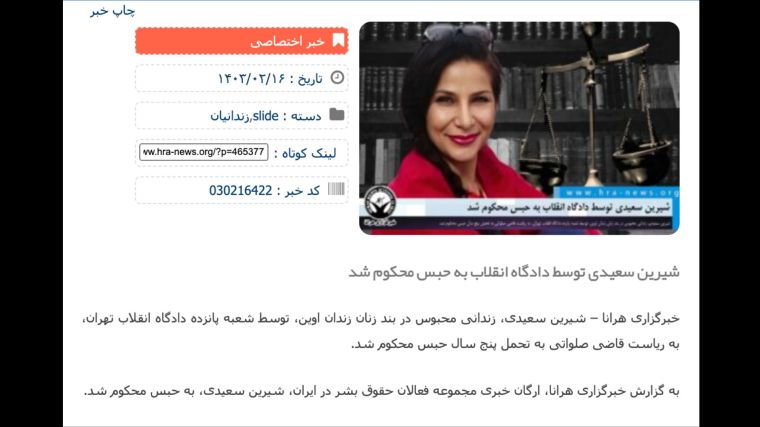Washington, D.C., May 9, 2024—Iranian authorities should immediately release economic journalist Shirin Saeedi from prison, drop all charges against her, and cease jailing members of the press for doing their jobs, said the Committee to Protect Journalists on Thursday.
Saeedi entered pre-trial detention on December 23, 2023, on charges of “colluding and assembling against the national security.” On May 1, the journalist was sentenced to five years in prison by Judge Abolqasem Salavati of Branch 15 of Tehran’s Revolutionary Court, according to news reports and a source familiar with the case who spoke to CPJ on the condition of anonymity due to the fear of government reprisal.
Saeedi, who has appealed the sentence, is waiting for the court to set a date for an appeals trial and is hopeful that her sentence will be reduced, according to the source.
“Iranian authorities must free journalist Shirin Saeedi immediately and unconditionally and cease the practice of arbitrarily locking up members of the press,” said CPJ Program Director Carlos Martínez de la Serna in New York. “The lack of transparency about Saeedi’s arrest and her lengthy pre-trial detention show once again how the Iranian regime feels free to act with impunity against the country’s press.”
Saeedi attended an international journalism workshop in Johannesburg, South Africa, in September 2022 and later traveled to Lebanon to participate in a similar program before returning to Tehran. Iranian authorities took issue with the nature of these workshops, according to the source.
CPJ’s email to Iran’s mission to the United Nations in New York requesting comment on Saeedi’s arrest and imprisonment did not receive any reply.
In addition to Saeedi’s case, there have been several other cases against journalists and obstructions of the work on the press in Iran in recent weeks:
On April 24, the office of Tehran’s General Prosecutor filed a lawsuit against Bahnam Samadi, a freelance economic reporter, in connection with an article he wrote about political tensions in the region between Iran and Israel, and the Israel-Gaza war, HRANA reported.
On May 1, the judiciary blocked the news website Didbaniran.ir without any explanation or prior notice, HRANA reported. According to a source who spoke to CPJ about on the condition of anonymity due to the fear of reprisal, authorities blocked Didbaniran.ir due to its daily coverage of national political issues, and as a result many journalists were laid off.
On May 2, Marzieh Mahmoudi, the editor-in-chief of the state-run TejaratNews economic site, was summoned by Tehran’s Media court. According to a report by HRANA, the summons did not include any information about her potential charges.
Several other Iranian journalists, including Asal Dadashlou, Hadi Kasaeizadeh, Mohammad Parsi, have been indicted and summoned by authorities for their coverage of international political issues, according to news reports.
